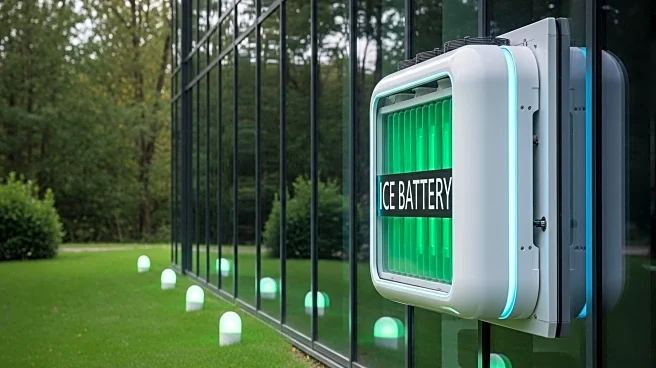What is the story about?
What's Happening?
Norton Audubon Hospital in Louisville, Kentucky, has implemented a thermal energy storage system known as ice batteries to provide air conditioning without emitting planet-warming gases. This system involves freezing water at night when electricity is cheaper, which then thaws during the day to cool the building. The technology is gaining traction in the U.S., particularly in schools, commercial, and government buildings, due to its ability to reduce electricity usage and alleviate grid strain. Companies like Trane Technologies and Nostromo Energy are leading the charge in this sector, with applications extending to energy-intensive data centers and residential homes.
Why It's Important?
The adoption of ice batteries represents a significant shift towards sustainable energy solutions in the U.S., addressing the growing demand for electricity amid rising temperatures. This technology not only reduces energy costs but also minimizes the environmental impact of air conditioning systems. As the U.S. grapples with climate change, ice batteries offer a viable alternative to traditional cooling methods, potentially transforming energy consumption patterns in various sectors. The technology is particularly beneficial for healthcare facilities and senior homes, where safety concerns around lithium batteries are prevalent.
What's Next?
The expansion of ice battery technology is expected to continue, with potential deals in the works for large data centers, which are increasingly vital for supporting artificial intelligence. As awareness grows, more facilities are likely to adopt this technology, driven by inquiries from building operators and the need for sustainable cooling solutions. California, with its reliance on solar power, is currently the largest market for ice batteries, highlighting the technology's role in load-shifting and reducing reliance on polluting energy sources.
Beyond the Headlines
Ice batteries could play a crucial role in the future of energy storage and grid management, offering a sustainable solution to meet cooling demands without exacerbating climate change. This technology aligns with broader efforts to decarbonize the grid and improve public health by providing reliable air conditioning during extreme heat events. As utilities face increasing pressure to manage peak loads, ice batteries offer a promising avenue for reducing operational costs and environmental impact.

















